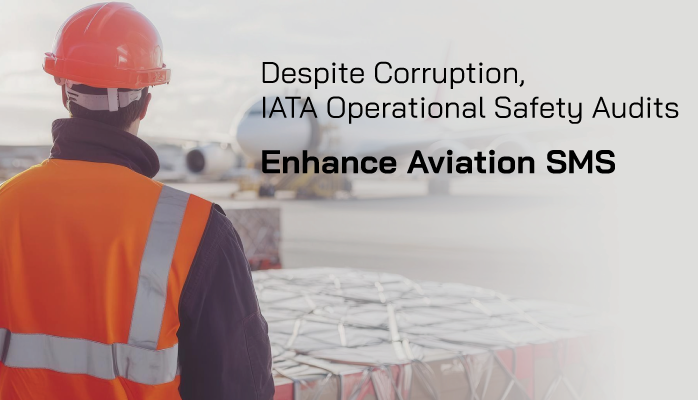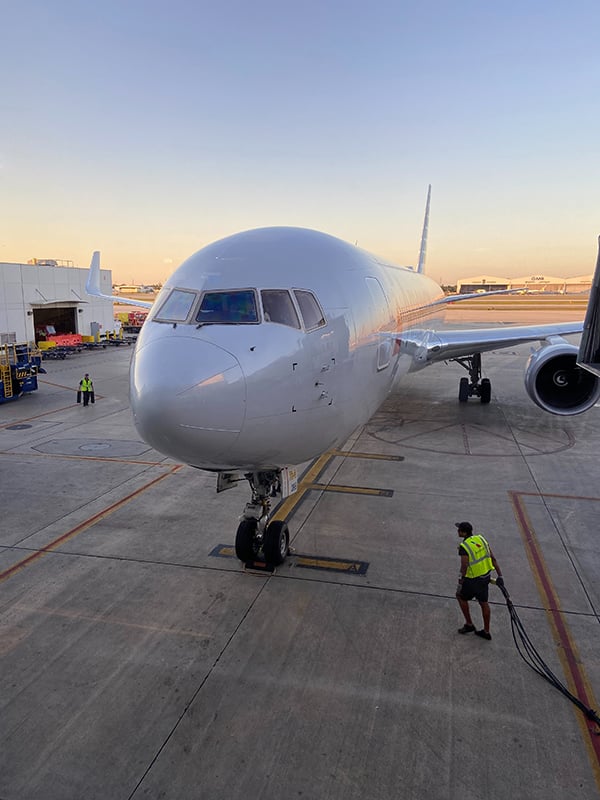Aviation Safety Audits Are Not for Just Airlines

Aviation safety managers must be prepared for a never-ending chain of audits. This is a fact of life, whether you are working at:
- Airlines;
- Airports;
- Ground handling companies;
- Flight schools; or
- Aviation maintenance organizations.
Aviation safety audits ensure operating practices, policies, and procedures comply with minimum recognized safety standards. Notice how we stress "minimum?" These minimum standards are the bedrock of every aviation safety process.
Related Aviation SMS Audit Articles
- Real Difference Between an Aviation Safety Audit vs. Inspection
- Aviation Safety Audits 101: Prep and Pass - With Examples and Checklists
- How to Create an Aviation SMS Audit Plan
Many civil aviation authorities around the world neglect to provide sincere and regular safety oversight. Yes, I said these words out loud. This is not a secret.
IATA has a couple of programs that help bridge the gap and help to improve aviation safety. These are in the form of internationally recognized audits, including:
While these auditing programs may not prove to be the perfect SMS prescription, they do provide an excellent jump start for any ICAO-compliant SMS. Even with auditors and operators corrupting the "auditing game," there can be some beneficial outcomes.
Audits & Reviews Crucial to Aviation Safety Management Systems
Effective aviation SMS will neither function nor improve without routine audits and reviews.
Aviation service providers conduct internal aviation SMS audits to ensure employees are following documented procedures. External audits provide objective oversight by regulatory agencies, customers, and recognized auditing organizations.
Aviation SMS reviews must also be carried out periodically and systematically. These SMS reviews help to assure management that the SMS implementation is:
- On schedule;
- Satisfying regulatory requirements; and
- Achieving the desired effect, including SMS benefits.
An aviation SMS review should take place once a year. Safety teams should review:
- Results of internal and external audits;
- Employee and stakeholder feedback;
- Regulatory compliance concerns;
- Status of outstanding corrective preventive actions;
- Follow up actions from previous management reviews;
- Organizational and regulatory changes that could affect the SMS; and
- Previous recommendations for improvements.
After each safety review, the safety team should document the results. SMS review documentation should include:
- Identified improvements to the SMS and safety processes;
- Proposed improvements to the SMS;
- Timeline for implementing proposed improvements; and
- Additional resources required for implementing proposed improvements.
Related Aviation SMS Auditing Articles
- Aviation Safety Audit Preparation - 4 Free SMS Audit Checklist Templates
- 5 Ways to Prepare for Aviation SMS Audits
- How Integrating QMS and SMS Will Improve Aviation Safety Audit Performance
Corruption in the Auditing Game

At least once per year, we hear stories about operators passing SMS audits when they should not have. This year, I've heard of two large airlines in Asia that continue to operate. One operates without any indication of an SMS, or perhaps to quote an auditor: "We saw no indication of an SMS program at" that airline.
What is disheartening is that the operator had been audited repeatedly by their civil aviation authority. The airline's CAA auditors gave the airline passing marks. I never heard of any negative outcomes for the operator, which is a state-run airline. Such things are often silenced.
State-run airlines appear to operate with impunity to audits. Since SMS was implemented in 2006, the airline I referenced above has had four major accidents, two of which had fatalities. A state-run airline is a "crown jewel" and critical for the economic security of the nation. One can logically see how they may receive "preferential treatment" during an audit. There are considerable political and economic factors that forbid removing the operating certificate.
While operators (even state-run airlines) love to boast the IATA, IS-BAO, and other recognized authorities' badges of approval, no operator willingly broadcasts the loss of such approval. Furthermore, how does a civil aviation authority penalize its national airline? It is like me finding myself $50 for drinking beer before lunch. Out of my left pocket with the $50 fine and straight into my right pocket with my $50 fine.
In the other case, an IATA-registered airline in Asia hires low-wage employees to operate in a high-risk environment. This practice isn't anything new. The problem arises when these low-wage employees are not properly trained to work in high-risk environments. According to the reporter, he was amazed at how the operator could continue to pass the IOSA audit when their safety culture didn't support successful audit scores.
In this case, employees were not properly trained and had no idea where to find documented procedures during unusual operating cases. There was no safety culture. Since then, there appears no indication that management is attempting to improve the safety culture, which must start from the top. It becomes almost implausible to conceive that change is possible, as management is ingrained in the company like a tick on a dog. Political connections and nepotism assure that change will be very slow in coming for these types of airlines.
Yet, there is hope as I see the younger generations are being trained in non-punitive reporting culture practices. These younger pilots and mechanics see "what should be happening." Maybe by the time they move into upper management positions in thirty years, they will be in a position to effect changes in the toxic safety culture.
Related Aviation Safety Culture Articles
- How Top Management Kills Aviation Safety Culture - With Examples
- 5 Simple Tips to Improve Aviation Safety Reporting Cultures
- 5 Characteristics of Effective Aviation Safety Cultures - With Free Survey
All Is Not Lost, Even With Corrupt Auditing Players
Corruption is the way business is carried out in some cultures. These cultures may not even see it as "corruption," but as a way of getting things done. This is how we've always done it, and it is the way business is conducted in every industry within the region, and not just the aviation industry. I would be wearing rose-colored glasses if I thought it were possible to see changes in the aviation industry while the rest of the region's culture continues to operate questionably according to Western values.
Yet, we can hope and be optimistic, yet realistic, in order to not become disillusioned with the "auditing game."
Auditing companies are paid to perform audits. If the auditing company or auditor wishes to be invited back to perform another audit, there is pressure to provide as favorable an audit report as possible.
There are also stories where individual auditors may look the other way when a "small fee" ends up in their pocket. And in extreme cases, auditors will submit audit reports without performing site audits. Have you heard of any egregious auditing scenarios? Drop me a line. I love to hear these stories as they educate me as to the realities of life. Too often, Western cultures live in their safe, secure environments with little exposure to how things are done in other cultures.
IATA has very good programs. Even when there is a corrupt relationship between the auditor and operator, all is not lost. Some good may come from it. Aviation service providers often initiate portions of an SMS in anticipation of an audit.
As years pass with these regular SMS audits, these small, incremental adjustments may add up to a substantial safety culture change. Perhaps this is why civil aviation authorities and auditing organizations are not doing more to end corruption in the "audit game."
Final Thoughts on IATA Auditing Programs Benefiting the Process
Safety managers become understandably frustrated when they work very hard to pass safety audits, only to see undeserved operators with the same certificates. Safety audits are about system safety. The system we must focus on is the entire aviation transportation industry.
What should hard-working safety managers do in these cases? Focus on what you have control over and not worry about the "audit game players."
Safety cultures do not change overnight. Audit corruption will not disappear overnight. Thankfully, even those playing the audit game are making safety cultural changes by the fact that they are playing the game and must become aware of the requirements.
What do you think about the aviation safety audit game?
Here are some auditing checklists to use in your internal safety audits. They are very useful to prepare yourself for the next audit.
If you need online or offline auditing tools built specifically for the aviation industry, you may want to consider SMS Pro's Audit Management System.
Last updated July 2025.








